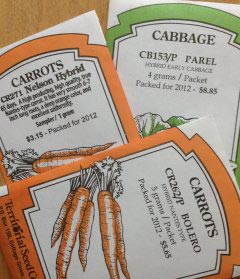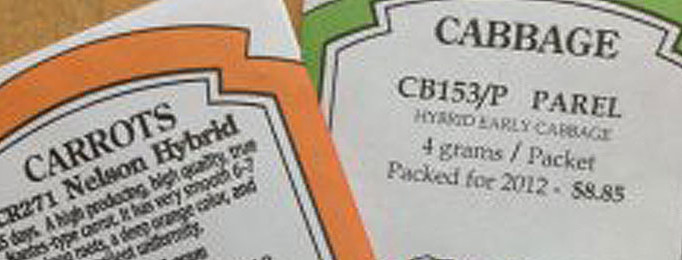 Hybrid seeds are seeds which have been specifically propagated, or ‘bred’ to achieve desirable traits in the next generation of plants. Hybrid seeds are the result of plant breeding which can be accomplished in various ways, including specific plant selection of seeds and elimination of other seeds in a single crop, or the cross pollinating of selected plants for improved flavor, yield, disease resistance, etc. Hybrid seeds generally will not produce true seed in the plants grown in the garden, but may provide such significant benefits that relying on seeds from the producer of the hybrid is a worthwhile expense.
Hybrid seeds are seeds which have been specifically propagated, or ‘bred’ to achieve desirable traits in the next generation of plants. Hybrid seeds are the result of plant breeding which can be accomplished in various ways, including specific plant selection of seeds and elimination of other seeds in a single crop, or the cross pollinating of selected plants for improved flavor, yield, disease resistance, etc. Hybrid seeds generally will not produce true seed in the plants grown in the garden, but may provide such significant benefits that relying on seeds from the producer of the hybrid is a worthwhile expense.
Hybrid seeds, or seed selection and breeding for specific traits, has been traced as far back as 11,000 years in human history. Modern methods include advanced technologies which include gene manipulation, marker assisted gene replacement, tissue culturing and a wide variety of highly developed genetic modifications up to and including the introduction of herbicide and insect resistant genes created in the laboratory and not made up of naturally occurring plant material.
Classical plant breeding relied upon the ongoing crossing of generations of plants to achieve a desired result. However, the presence of genetic traits and their expression can now be accomplished through manipulation of the gene and chromosome structure itself. Where the classical system relied on observation of the new hybrid and further crossing of future generations for its result, these newer technologies can greatly reduce the steps necessary to accomplish the introduction and expression of specific traits.
The veritable explosion of the bio-tech industry in the last three decades has greatly increased the percentage of food crop seeds which are now ‘manufactured’ through various breeding, hybridizing and genetic manipulation. It is estimated that up to 85% of all food crop seeds grown world-wide are now patented seeds owned by only a handful of major corporations.
It is this rapid increase in patented seeds, and the alarming decline in seed diversity in the food crops which has led to a resurgence of interest in open pollinated and heirloom food crop seeds.
Additionally, many farmers and seed producers have subscribed to the safe seed pledge, which means they will not knowingly engage in seed production methods which include genetic manipulation across species or using viral agents to introduce genetic materials to plants.
Hybrid Seeds and The Safe Seed Pledge (from the Council for Responsible Genetics (CRG))
Agriculture and seeds provide the basis upon which our lives depend. We must protect this foundation as a safe and genetically stable source for future generations. For the benefit of all farmers, gardeners and consumers who want an alternative, we pledge that we do not knowingly buy or sell genetically engineered seeds or plants.
The mechanical transfer of genetic material outside of natural reproductive methods and between genera, families or kingdoms, poses great biological risks as well as economic, political, and cultural threats. We feel that genetically engineered varieties have been insufficiently tested prior to public release. More research and testing is necessary to further assess the potential risks of genetically engineered seeds. Further, we wish to support agricultural progress that leads to healthier soils, genetically diverse agricultural ecosystems and ultimately people and communities.
Resources:
More about Safe Seeds: You can learn more about Safe Seeds at the Council for Responsible Genetics (CRG). CRG is a non-profit/non-governmental organization (NGO) devoted to fostering public debate about the social, ethical, and environmental implications of new genetic technologies. http://www.councilforresponsiblegenetics.org/.
VegetableGardenHub: Vegetable Seeds


